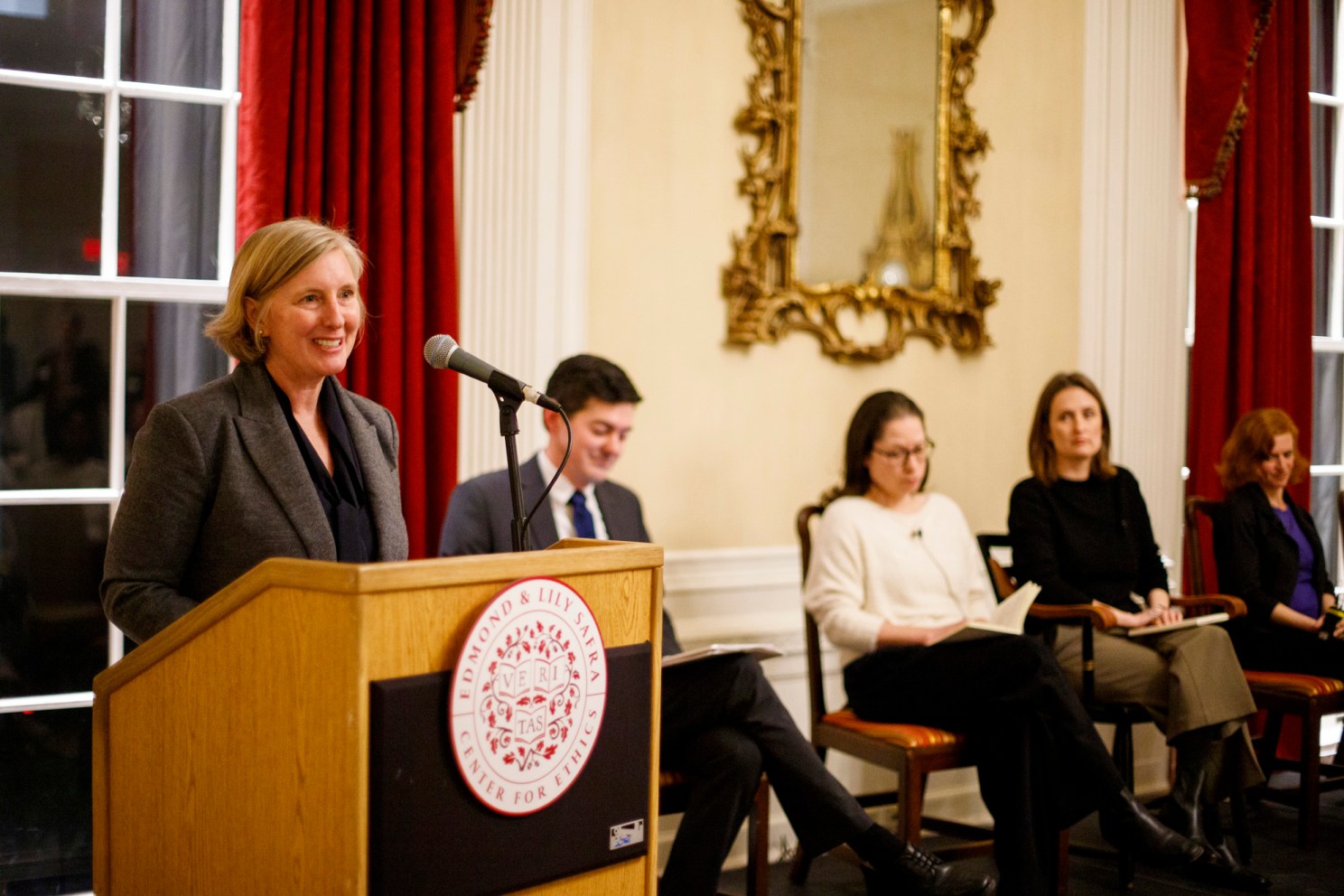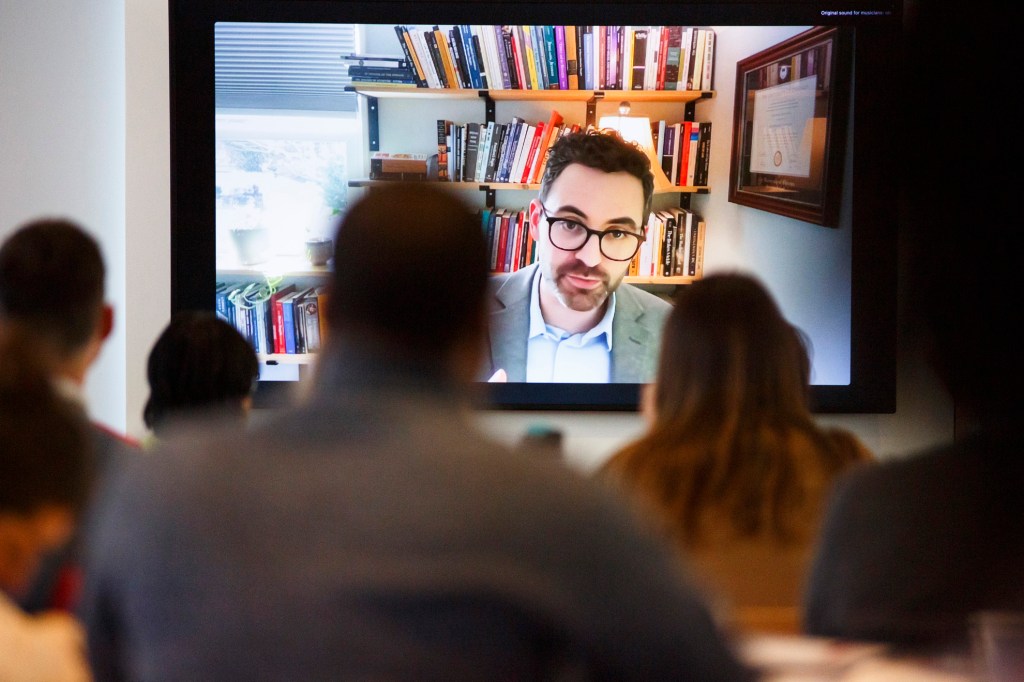Keeping cool when debate turns hot

Dean Hopi Hoekstra gives opening remarks.
Photos by Grace DuVal
Inaugural global Ethics Center conference features scholarship, presentations on fostering civil, productive dialogue
Americans today are wrestling with how to turn down the heat when discussing politically and morally charged topics.
Students, professors, and education professionals from around the globe assembled at Harvard this month to chart their way to more productive discussions — and better relations. The inaugural Challenging Barriers to Civil Discourse conference, hosted by the Edmond and Lily Safra Center for Ethics, featured scholarship on fostering open, honest exchanges across deep divides.
It’s a pursuit central to a healthy democracy, said Hopi Hoekstra, Edgerley Family Dean of the Faculty of Arts and Sciences. “Civil discourse is one of my top priorities,” she told conference-goers. “Universities play a unique and critical role in modeling constructive dialogue, and I believe that our classrooms and campuses can — and should — serve as laboratories for meaningful engagement across differences.”
Several panelists provided practical tips drawn from Alternative Dispute Resolution (ADR), an umbrella term for methods used to resolve disputes without litigation. Julia Kolak, an instructor in the Department of Epidemiology and Population Health at the Albert Einstein College of Medicine and clinical ethics fellow at Montefiore Medical Center in the Bronx, offered a powerful account of the “values extraction” approach she uses when frictions arise between patients and clinicians.
Kolak told of mediating clashes that arose when women refused treatment for nonviable (and life-threatening) ectopic pregnancies, or when the family of a critically ill patient (suffering from cardiac arrest and septic shock) resisted end-of-life care. She works to unearth the principles guiding all parties, without elevating those with medical expertise. “When we treat others as capable of dialogue,” she offered, “it really changes the affective grip of conflict.”

Other conference speakers drew on historic wisdom. Nicholas Buck, a philosophy lecturer from American University, borrowed from Martin Luther King Jr.’s writings to illustrate why institutions should shift their focus from managing disagreement to building a sense of mutual belonging — what King called “the beloved community.”
One conference-goer asked how King’s ideas intersect with the worldwide rise of anti-intellectualism. “It seems to me it comes from a sense of exclusion,” Buck replied, circling back to King’s communal vision.
Philosopher Jeffrey Dunn invited attendees to join him for a little soul-searching. The associate director of the Prindle Institute for Ethics at DePauw University raised the critical question: “What is the long-term goal of this work?”
“It’s not really about changing views; it’s about building empathy or understanding for the other side,” he said. “Robert Talisse, the political philosopher, has a book where he argues that the way to increase empathy is not to discuss politics together, but to actually do nonpolitical things like play pickleball or join a softball team.”
The conference provided a taste of the sort of programming regularly offered by the FAS’ Civil Discourse initiative. It also marked a soft launch for the Ethics Center’s research and design studio, a hub for sharing civil discourse innovations.
“We hope this lab will advance basic research on civil disagreement, contribute to pedagogy, and advance social scientific measures of constructive dialog,” said Eric Beerbohm, the Alfred and Rebecca Lin Professor of Government and leader of the Ethics Center and the Civil Discourse initiative.
Event participants included an international set of academics as well as proctors and tutors participating in Harvard College’s FiVE Fellowship in Values Engagement and undergraduates with the Intercollegiate Civil Disagreement Partnership Fellowship, a program led by a consortium that includes Harvard plus five other schools in California, Indiana, Florida, and Texas.
The fellows encountered a wealth of scholarship applying specifically to campus life. Marie Newhouse, an associate professor of law, philosophy, and public policy at the University of Surrey in the U.K., drew on Oxford philosopher Teresa Bejan’s “Mere Civility.” The 2019 title put philosophers Thomas Hobbes and John Locke in conversation with Rhode Island’s 18th-century founder Roger Williams.
“He established radically tolerant policies when it comes to religious and lifestyle differences in the community,” Newhouse explained. “He thought that keeping everybody talking to each other was the most important thing, and in order to achieve that he was prepared to deal with more rancor.”
Ideas from Bejan’s book were used to map a triangle of features inherent to any society wrestling with open inquiry: stability, discourse, and diversity. “It’s like that internet meme that gives you three things — fast, cheap, and good. Pick two!” Newhouse quipped.
She hypothesized that higher education had started to prioritize the Lockean ideal of social cohesion while suggesting it aim for something closer to Williams’ model.
“People enjoy living in cohesive communities,” Newhouse said. “But I wonder if it’s starting to interfere with the mission of the university, which requires robust discourse across deep disagreement.”
Equally relevant to current challenges besetting college campuses was a talk by St. Lawrence University education professor Jeff Frank about a recent project where faculty partnered with students to pilot a novel approach to advancing civil discourse.
An internal campaign they call “Be a Saint” trumpets the community’s shared values of listening, respect, and engagement with a bonus reference to the school’s athletics teams. The effort is currently being expanded to include initiatives tied to fortifying students’ mental health, Frank shared.
“It’s in everybody’s best interest to learn how to live in a pluralistic society,” he said. “So our messaging now is that this is in your personal best interest. You’re not just doing this for the institution.”




